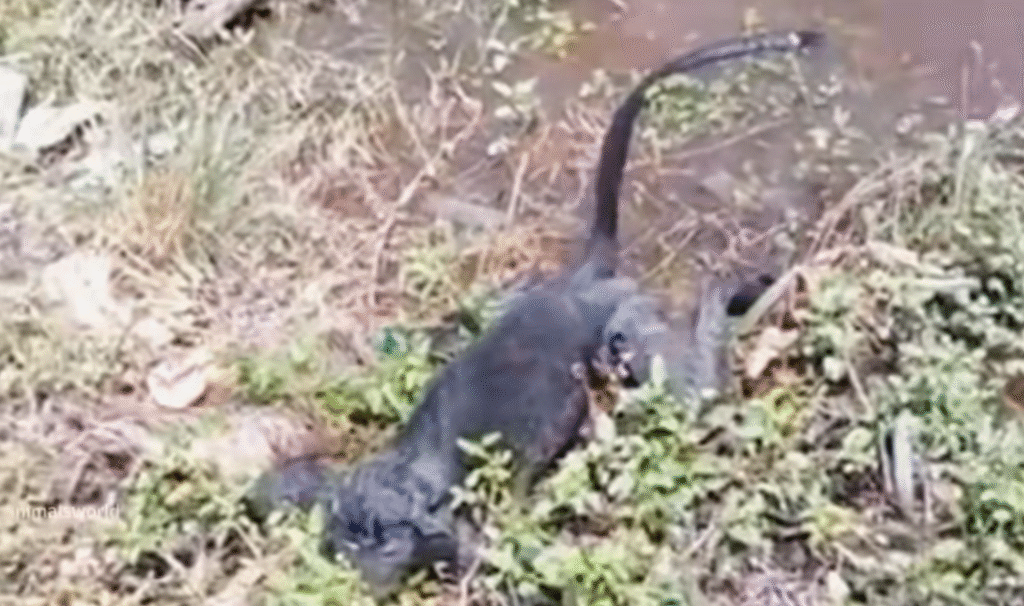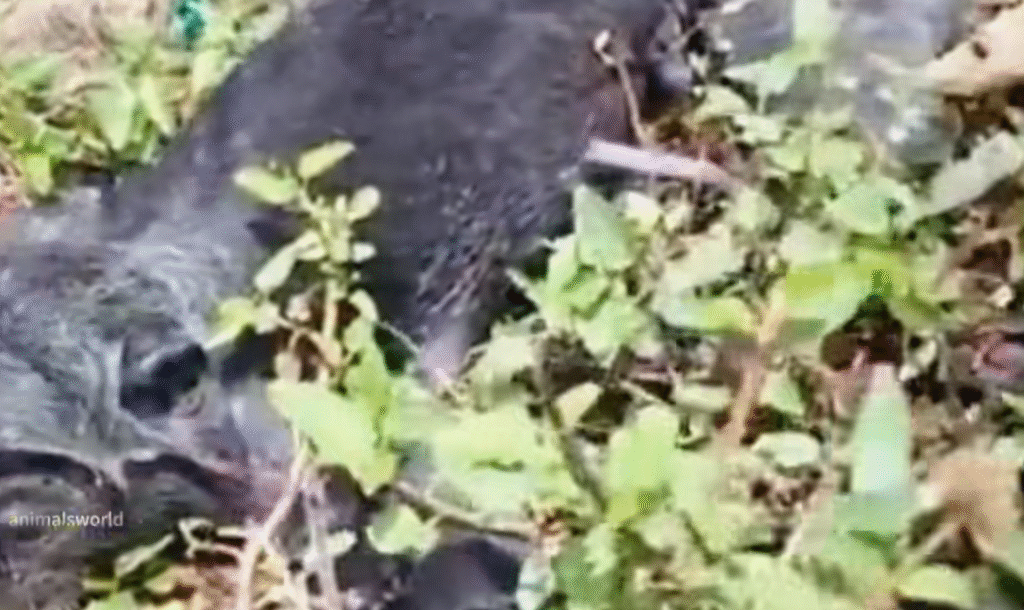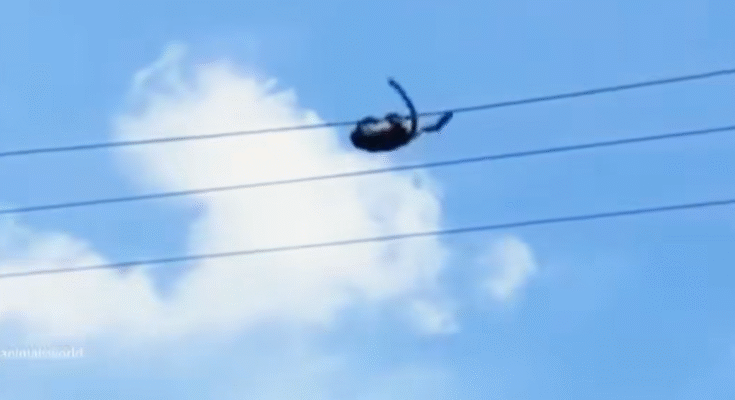The sun was barely rising over the quiet village when a troop of monkeys wandered out of the forest in search of breakfast. The leader of the troop, a clever young monkey named Kalo, had grown curious about the world beyond the trees. Every morning he guided his younger siblings, Miko and Luni, across familiar paths—stone fences, fruit trees, and the roofs of old wooden houses.
But today was different.

As they moved closer to the village center, Kalo spotted something new: tall metal poles stretching high into the sky, humming softly. Cables ran between them like giant vines, swaying slightly in the breeze. To Kalo, they looked like exciting new pathways waiting to be explored.
“Look! New climbing vines!” Miko said, eyes shining.
Luni clapped her tiny hands. “Can we swing on them? They look fun!”
Kalo hesitated. The wires didn’t move like vines. They buzzed. They shimmered strangely. And the air around them felt sharp—for reasons he did not understand. But as the leader, he wanted to be brave. He stepped closer, sniffing, watching the wires carefully.

Down below, an old villager named Dara stepped out of his house and noticed the monkeys edging toward the electrical poles. His heart dropped. He had seen other animals get too close to those dangerous lines before. “No! Not the children,” he muttered urgently.
He started shouting and waving his arms to scare them away, but from the monkeys’ point of view, he only looked like a human trying to chase them for fun.
Kalo puffed out his chest. “Don’t worry,” he told Miko and Luni. “I’ll check it first.”
He climbed onto the pole.

At that very moment, Dara sprinted across the yard. “Stop! Stop!” he shouted. But his voice was drowned out by the hum of the high-voltage wires.
Kalo reached a metal beam just a few feet below the thick cables. The closer he got, the more the air seemed to vibrate. His fur lifted slightly, though he didn’t understand why. He looked back down at Miko and Luni, who watched him with wide, trusting eyes.
“It’s okay!” he called to them. “I think it’s just another place to play.”
But the moment he reached up, one small paw stretching toward the wire, something unexpected happened.
A spark snapped through the air—not touching him, but close enough to startle him. The sharp sound made him jerk backward. His grip slipped.
For a terrifying second, he dangled from one hand, legs flailing. Miko squealed. Luni covered her face. Dara gasped, hand pressed over his mouth.
“Kalo! Come down!” Dara yelled desperately. Even though the young monkey couldn’t understand the words, he could feel the fear in the man’s voice.
Kalo’s instinct kicked in. He swung his body and grabbed onto a lower beam before he could fall. His heart pounded. He scrambled down the pole as fast as he could, shaking all over.
Miko and Luni ran to him the moment his feet touched the ground.
“Kalo! Are you okay?” Miko asked, clinging to his arm.
“That thing is scary,” Luni whispered. “It made a snapping noise.”
Kalo nodded, still breathless. “We’re not going up there again.”
But their dangerous moment wasn’t over yet.
The spark had traveled farther than Kalo realized. The electricity didn’t need to touch him to create danger—the air itself carried a tiny discharge. Though it didn’t injure him, the noise and sudden shock had frightened the entire troop, who had started arriving from the forest to join the younger ones.
A few curious adults climbed onto nearby roofs, thinking the commotion meant food. They, too, noticed the poles. And as soon as one adult moved toward the wires, the younger monkeys followed.
Kalo’s fear returned instantly. He stood up straight, puffing his chest, trying to act like the brave leader again. “No!” he barked loudly, shaking his head. “Not safe!”
The troop froze. They respected Kalo, even though he was young. Whenever he used that commanding tone, they listened.
Dara understood what was happening. He rushed inside his house and came back with a handful of bananas and a plastic bowl. He placed the fruit on the opposite side of his yard, far from the power lines, and tapped the bowl until the monkeys turned their heads.
Kalo sniffed the air. “Bananas! Real ones!”
Luni tugged his arm. “Let’s go!”
The troop followed Kalo toward the fruit, leaving the electrical poles behind. Dara watched them nervously until every single monkey was a safe distance away.
For a while, the troop enjoyed breakfast peacefully, peeling bananas and dropping peels in every direction. The morning danger seemed forgotten—at least to Miko and Luni, who were now wrestling on the ground over a piece of banana stem.
But Kalo was still thinking about what had happened.
As he chewed slowly, he kept glancing back toward the pole. The hum in the air had felt wrong—like a warning. It didn’t sound like wind. It didn’t feel like trees. It was something entirely unfamiliar and frightening.
When the troop finished eating, Dara stepped closer—not too close, just enough that the monkeys could hear his gentle voice.
He pointed at the high-voltage lines and said softly, “Danger. No climbing there.”
He tapped his chest twice, then pointed again. “Danger.”
Kalo didn’t understand the words, but he understood the man’s tone. He let out a soft grunt, signaling to his troop that they were leaving. One by one, they climbed down from the roof and fences and followed Kalo back toward the forest.
As the troop disappeared into the trees, Dara let out a long breath of relief. He wiped his brow. “They were lucky today,” he whispered to himself. “Very lucky.”
Back in the forest, Kalo gathered the younger monkeys at the riverbank. He pointed toward the village and let out a warning sound—a sharp, repeated grunt they all recognized.
“We shouldn’t climb the tall metal vines,” he explained. “They’re not like trees. They bite.”
Miko’s eyes widened. “Bite? Like a snake?”
“Worse,” Kalo said simply.
The little ones nodded solemnly. Monkeys learn fast, especially when their leader shows fear.
Over the next days, Kalo kept the troop away from the village center. Whenever he guided them through the area, he led them along safer routes far from those buzzing poles. And whenever the younger monkeys asked about the “metal vines,” he would shake his head firmly.
“Not for us,” he would say. “Too dangerous.”
But the memory of that spark stayed with him. Even long after the troop returned to their usual routines—climbing branches, splashing in streams, stealing fruit from old baskets—Kalo never forgot the lesson he learned that morning.
And because he remembered, the whole troop stayed safer.
The village, too, took notice. After seeing Kalo’s near-disaster, Dara spoke to the local council. Within weeks, workers came to install protective coverings and warning signs around the poles. People started reporting sightings of wildlife near dangerous areas so they could be gently guided away.
It wasn’t just about one monkey—it was about keeping everyone safe, humans and animals alike.
And so, in the end, Kalo’s frightening experience helped protect many others. What began as a near-fatal mistake became a powerful reminder: curiosity can lead to danger, but awareness can save lives.
The monkeys never went near the high-voltage power lines again.
And the forest was just a little safer because Kalo survived to warn his friends.



